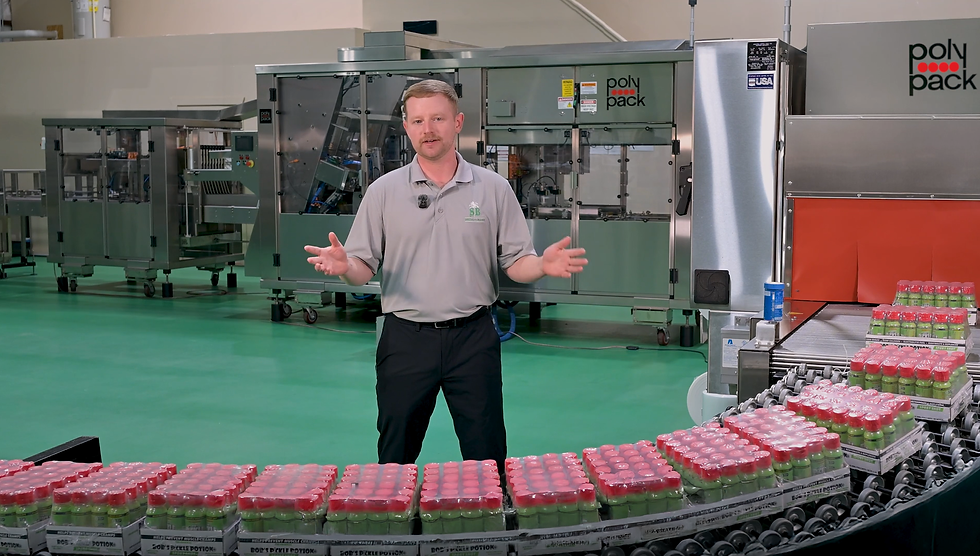Embracing Sustainability: Refillable and Reusable Packaging Revolutionizing the Industry
- Marketing Polypack
- Aug 15, 2023
- 3 min read
Updated: Dec 6, 2023

Embracing Sustainability: Refillable and Reusable Packaging Revolutionizing the Industry
In a world grappling with the environmental consequences of single-use plastics, a positive change is stirring in the realm of packaging. Forward-thinking companies are stepping up to the challenge, introducing innovative ways to reduce their reliance on disposable packaging and embracing refillable and reusable alternatives. In this blog, we'll delve into recent examples from Coca-Cola, Procter & Gamble (P&G), and W&P that exemplify this transformation and explore their implications for packaging machine manufacturers in the context of shrink film and corrugate.
The Growing Momentum Towards Sustainability
As the urgency to combat plastic pollution becomes more apparent, the trend towards refillable and reusable packaging is gaining substantial momentum. This movement is driven by both the consumer demand for environmentally conscious options and the goals set by initiatives like the Plastic Pact, which aims to achieve reusable packaging by 2025. While smaller brands and startups have been leading the charge, larger multinational corporations are now dipping their toes into the waters of sustainable packaging through trial initiatives.
Coca-Cola's Reusable Doorstep Delivery Bottle
One striking example of this paradigm shift comes from Coca-Cola Europacific Partners (CCEP) and their partnership with doorstep delivery company Milk & More. The trial involves reusable glass bottles for Coca-Cola Zero Sugar, which can be washed, refilled, and reused up to 20 times. This initiative not only reduces the carbon footprint by 82% compared to single-use glass but also aims to engage 100,000 consumers in the trial. This showcases the potential for scalable adoption of refillable packaging solutions within a major global brand.
Procter & Gamble's Refill Pack for Dish Soap
Procter & Gamble Spain is also making strides toward sustainability with their introduction of board refill cartons for their Fairy Maxi Power dishwasher soap bottles. Each refill pack reduces plastic use by a substantial 85%, allowing consumers to reuse their soap bottles more than twice. By offering practical solutions that resonate with environmentally conscious consumers, Procter & Gamble is contributing to the ongoing shift in consumer behavior and expectation.
W&P's Innovative Reusable Stretch Wrap
In a kitchenware market dominated by single-use plastic wrap, W&P is shaking things up with their reusable stretch wrap. Made from durable, super-stretchy, and ultra-thin platinum silicon, this product offers a sustainable alternative to traditional cling wrap. With its versatility and various applications, this product not only helps individuals reduce their waste but also serves as a model for sustainable innovation within the broader packaging landscape.
Implications for Packaging Machine Manufacturers
For manufacturers of packaging machinery, the rise of refillable and reusable packaging introduces new challenges and opportunities. The packaging materials of choice are shifting from disposable options like shrink film and corrugate to more durable and versatile materials like glass and board. As companies adopt these sustainable alternatives, packaging machines need to be adaptable and equipped to handle these materials effectively.
Moreover, the growth of refillable packaging introduces the need for automated systems that facilitate the washing, refilling, and sanitizing processes. Machines that can efficiently clean and sterilize glass and other reusable materials will play a crucial role in scaling up these initiatives.
In conclusion, the examples from Coca-Cola, Procter & Gamble, and W&P serve as beacons of hope in a landscape marred by plastic pollution. These companies are proving that sustainability and profitability can go hand in hand, and their initiatives are driving the transformation of packaging practices. As the packaging industry evolves towards refillable and reusable solutions, packaging machine manufacturers must embrace innovation and adapt their offerings to meet the demands of this new era of sustainable packaging.
Reference:
"ThePackHub. (August 3, 2023). Coca-Cola Coke Zero Doorstep Bottle Delivery, Procter & Gamble Board Dish Soap Refill, W&P Reusable Stretch Wrap." Retrieved from: https://www.packworld.com/news/sustainability/article/22869357/thepackhub-cocacola-procter-gamble-and-wp-introduce-refillable-and-reusable-packaging-innovations?utm_source=Newsletters&utm_medium=PW+Shelf+Impact+NL&utm_term=20230815&oly_enc_id=2782E0215356J4G


Comments